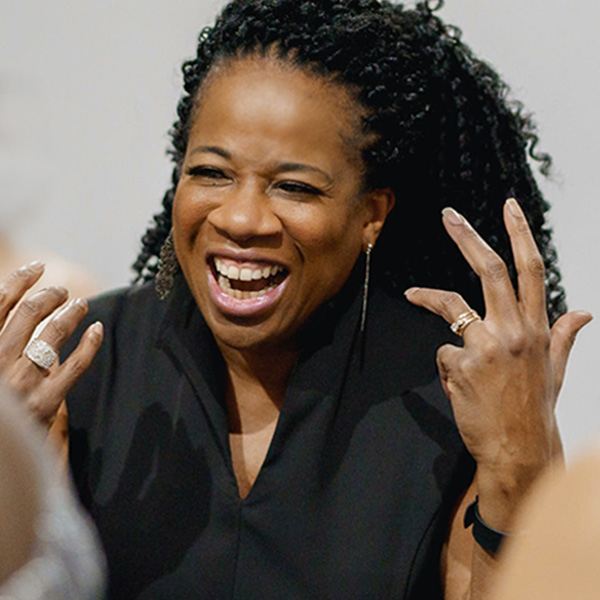After 14 months of not being able to do what he does best, Sam Roberts, BA’98, can finally see the light at the end of the tunnel.
“Wishful thinking, but I hope so,” Roberts says regarding a return to normalcy. “It’s been a roller coaster, and it’s amazing to think how much we used to take for granted knowing the next [gig]. We depended on that. Now I haven’t made any concrete plans beyond a day in over a year.”
For Roberts, normal would mean hitting the road with his namesake Sam Roberts Band, a tight-knit group that has been together for almost two decades. Instead, the popular Canadian rockers released their seventh album, All of Us, last October without the usual live shows to properly contextualize their latest work.
Behind the scenes, they’ve had shows booked, then postponed, then postponed again. Most bands have been in the same predicament in 2020 and 2021. Roberts told The Montreal Gazette that he was particularly looking forward to a hometown booking this July that got scuttled – opening for Bon Jovi at the Bell Centre.
“We’ve only ever rehearsed [the album] a few times, and it was more imagining what these songs would sound like live,” Roberts says from his home in Montreal’s NDG neighbourhood. “We haven’t done that formal process where we figure out how to play the new record while incorporating the deep cuts.”
Without the shows, Roberts says All of Us still feels “like an infant,” an album that hasn’t had a chance to grow or age. It has attracted attention, though. All of Us earned a Juno nomination for Rock Album of the Year, and the Sam Roberts Band is also up for Group or Duo of the Year at the Independent Music Awards.
But at a time when he would normally be touring to promote a new album, Roberts has been staying at home, hanging out with his kids, walking the dog, and listening to music – much of it, his own.
“To be completely above board, I listen because I want to make sure I can remember how to play these songs,” he says.
One older album that he has listened to with fresh ears is Chemical City. The group’s platinum-selling second album turns 15 in August, and to mark the milestone, Roberts and his bandmates retrieved four previously unreleased bonus tracks for a remastered edition, called Chemical City (Redux).
Chemical City was always meant to include those four songs, but it was pared down at the time to keep the record concise.
“We realized there was something in them that completed the picture of the record,” says Roberts. “There was a whole side of the record missing. With this version, we’ve managed to piece it together as we would’ve wanted it back in 2005.”
In listening to Chemical City, Roberts also got an opportunity to reconnect with his younger self. Lyrically, he was a political firebrand in his youth, closer to the Downie/Cockburn tradition of socially conscious Canadian songwriting than the burgeoning worldwide hedonistic indie rock scene he emerged in. He used to have audiences spell out S-O-C-I-A-L-I-S-M, from the song “The Canadian Dream” from his breakthrough debut album We Were Born in a Flame.
“I used to feel like I had to say something about everything,” Roberts says. “Chemical City was actually a way to move away from that mindset. It was about creating your own alternate reality. It still said things, but told them through a fantasy world.
“But there’s also a part of me that appreciates the fearlessness in my creative choices back then. It’s a good thing for me to reconnect with that, to not overthink and trust my instincts.”
Roberts sees similarities in the world he’s living in today and the one that existed when he began his career.
“We think of the world today as being on the brink of calamity,” he says. “But I remember it being a heavy place then too. There was 9-11, and there was a question of whether you were going to be brave enough to speak out and voice your opinion.”
It’s why a lot of music that speaks to political issues of the day age well, Roberts suggests, because the same battles tend to recur and there’s a timelessness to the struggles people face. Like most young people, his time in university helped shape his worldview.
It also helped define his sound musically. Prior to McGill, Roberts was in a number of more style-oriented bands. He copied the Manchester sound for much of the nineties. He wore mod suits and imitated his heroes. His childhood friend and now longtime bassist James Hall, BA’98, was his classmate at McGill.
“McGill was part of our band’s formative years,” the English literature grad says. “It was where we gathered every day to talk about American literature while scheming and strategizing, making our big moves after we left school. I think it’s something a lot of students struggle with, but it’s an important part of the experience.”
Roberts is proud he stuck it out and graduated, but the three years in between graduation and his big break in music was one of the most difficult times in his life. Pursuing his degree, he recalled, allowed him a brief respite from obsessing about a music career day and night. Once he was done, it was a difficult transition to get his music dreams on the right track.
“I can’t tell you how many times I nearly threw in the towel,” he says. “I was starting to feel the pressure of it not happening. Two years after graduating, I even walked into McGill’s English department to get an application to work there. I didn’t take one in the end. I even hit a point where I walked into an army recruitment station. Now, that’s pretty out of character for me.
“Those are the three longest years of my life. To my parents’ credit, and my girlfriend, now wife’s, they were very patient and supportive. By the time 2001 rolled around I was already 26-27, and that’s pretty late to get your first break. We’d been playing in a band forever, but nothing tangible enough that you can build a future career on.”
Fast forward to 2021, and Roberts is now an elder statesman in the Canadian music scene. The videos for songs like “Brother Down,” “Hard Road,” “Bridge to Nowhere,” and “Where Have All the Good People Gone” have attracted millions of views on YouTube. He has received 15 Juno nominations and won six of them. He has twice been named Artist of the Year at the Junos, part of a small group of two-time winners that also includes Feist, Shawn Mendes, The Weeknd and Leonard Cohen, BA’55, DLitt’92.
As difficult as his early years were, Roberts says younger artists have it even harder today. The prohibitive costs of becoming a working musician are keeping talented artists from reaching their potential. If musicians can’t get traction right away, they’re more likely to give up.
“We’ve benefited from mentorship in our careers, and I think it’s important we return the favour,” Roberts says. “But I think the biggest hurdle right now is not the strength of musical community itself, it’s the fact that as an industry, artists have become a pawn for a lot of different machines, none of which are paying musicians for the music.
“The idea that the music we make has little to no commercial value these days, It puts an enormous amount of pressure on established artists to keep going, let alone for up-and-coming artists who don’t have their feet underneath them. So how many people aren’t even going to be given a chance to make a statement with music? It’s already so close to being a non-viable way of life.
“The only solution? I think it will come from people recognizing that music is of value. Music is of value in the same way that if you go out for dinner and support your local restaurant.”


